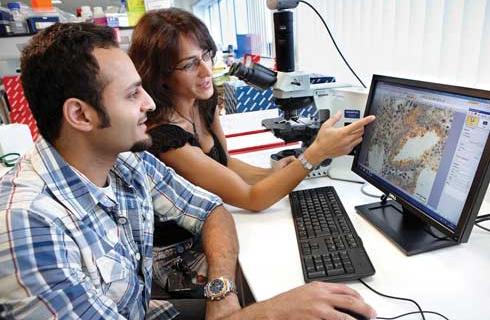Bachelor of Science in Geology and Geophysics

学历文凭
Bachelor Degree

专业院系
地质学

开学时间

课程时长

课程学费

国际学生入学条件
To be considered for admission, you must have completed or are in the process of completing secondary school with a cumulative or overall grade point average (GPA) equivalent of B or higher. Focus will also be on the grades/marks you have received for Mathematics and Science courses. TOEFL (iBT)- 100, TOEFL (PBT) - 600, IELTS (Academic Section) - 7.0.
IDP—雅思考试联合主办方

雅思考试总分
7.0
了解更多
- 雅思总分:7
- 托福网考总分:100
- 托福笔试总分:600
- 其他语言考试:NA
CRICOS代码:
申请截止日期:请 与IDP联系 以获取详细信息。
课程简介
The Department of Geology and Geophysics (GG) is dedicated to the scientific study of the exterior and interior of the Earth and other planetary bodies. Sub-disciplines within GG are many, and offer rich opportunities for multidisciplinary study of problems of great intellectual and practical importance. Coastal geologists study processes such as sedimentation and beach erosion, reef growth and degradation, and sea level change. Hydrologists and Hydrogeochemists study the cycling of fresh water between the atmosphere, land, and ocean. Of particular emphasis is how climate change impacts this cycle, how fresh water supplies are impacted by human activities, including land-use practices and the introduction of contaminants into surface and groundwater, and how climate, hydrologic, and terrestrial processes impact the ocean and its ecosystems by way of surface water and submarine groundwater discharge. Structural geologists study the physical features produced in rock units by deformational processes such as mountain building, rifting, and earthquakes. Engineering geologists provide geotechnical recommendations affecting the design, construction, and operation of engineering projects based on Earth material properties, geological structures, and processes such as faulting, landslides, erosion, and flooding.This BS degree is designed for students interested in pursuing graduate work or employment in the geosciences. It provides essential grounding in computational, analytical, and observational skills needed in Earth Science. The program is interdisciplinary and emphasizes the integration of biology, chemistry, physics, and mathematics in the study of the Earth. A total of 37 credits are required in the GG curriculum, including one introductory level geology course with a lab, nine GG courses, a two-credit research seminar, and eleven credits of GG electives. With advice and consent of an undergraduate advisor, courses in other natural sciences, mathematics, or engineering can also be taken as electives. Students are strongly encouraged to take a summer field course as an elective. An undergraduate thesis is also encouraged but not required. The required supporting science classes (28-30 credits) include physics, chemistry, biological science, and college calculus, and should be taken as early as possible. A minimum grade of C (not C-) must be achieved in each class of the major and in all support classes.
相关申请

预科

奖学金

实习机会

在校学习

跨境学习

校园授课-线上开始

在线/远程学习
学校排名
世界排名
201
数据源:泰晤士高等教育世界大学排名
本校相关课程
Master of Science in Zoology

学历文凭
Masters Degree
下一个开始日期
课程费用总额
Master of Urban and Regional Planning

学历文凭
Masters Degree
下一个开始日期
课程费用总额
Master of Science in Tropical Plant Pathology

学历文凭
Masters Degree
下一个开始日期
课程费用总额
Master of Science in Tropical Plant and Soil Sciences

学历文凭
Masters Degree
下一个开始日期
课程费用总额
Master of Science in Travel Industry Management

学历文凭
Masters Degree
下一个开始日期
课程费用总额
Master of Fine Arts in Theatre

学历文凭
Masters Degree
下一个开始日期
课程费用总额
其他相关课程
Bachelor of Science in Earth and Space Science with Teaching

天普大学
泰晤士高等教育世界大学排名:459

学历文凭
Bachelor Degree
下一个开始日期
课程费用总额
地球科学教育理学硕士

东密歇根大学
泰晤士高等教育世界大学排名:

学历文凭
Masters Degree
下一个开始日期
课程费用总额
地球与行星科学文学硕士

圣路易斯华盛顿大学
泰晤士高等教育世界大学排名:

学历文凭
Masters Degree
下一个开始日期
课程费用总额
Bachelor of Science in Geology

南佛罗里达大学
泰晤士高等教育世界大学排名:395

学历文凭
Bachelor Degree
下一个开始日期
课程费用总额
Bachelor of Science in Geology

伊利诺伊州立大学
泰晤士高等教育世界大学排名:

学历文凭
Bachelor Degree
下一个开始日期
课程费用总额
Master of Science in Earth Sciences

俄亥俄州立大学哥伦布分校
泰晤士高等教育世界大学排名:

学历文凭
Masters Degree
下一个开始日期
课程费用总额




